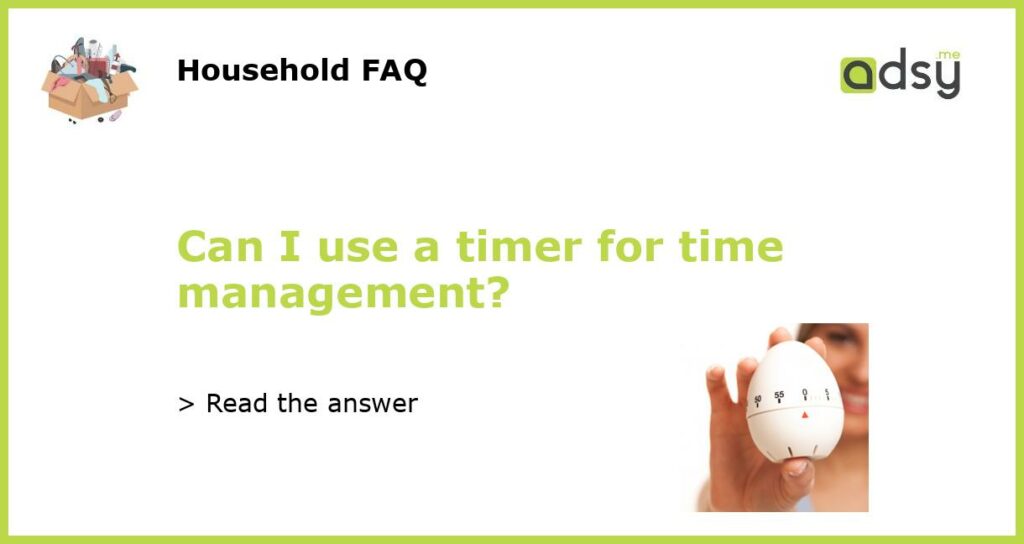Yes, Using a Timer Can Be Effective for Time Management
Managing time efficiently is essential to maximize productivity and reduce stress. With the countless distractions and responsibilities we face every day, it can be challenging to stay focused and use our time effectively. One technique that can help improve time management is using a timer. While it may seem counterintuitive to use a timer to manage time, it can actually be a powerful tool to increase productivity and improve focus. In this article, we will explore how using a timer can be effective for time management.
The Pomodoro Technique: Enhancing Focus and Productivity
The Pomodoro Technique is a popular time management method that involves breaking your work into intervals usually lasting for 25 minutes, called Pomodoros, separated by short breaks. After completing a certain number of Pomodoros, you can take a longer break. This technique helps improve focus and productivity by dividing your work into smaller, manageable chunks, and allowing you to take regular breaks to recharge.
Using a timer to implement the Pomodoro Technique can help you stay on track and avoid getting lost in a task for an extended period. By setting a timer for each Pomodoro, you create a sense of urgency and commitment to work during that time. It also helps you resist distractions and stay focused on the task at hand. When the timer goes off, it signals a break, allowing you to recharge and come back refreshed for the next Pomodoro.
Time Blocking: Allocating Time for Specific Tasks
Time blocking is a time management technique that involves scheduling specific blocks of time for different tasks or activities. By allocating dedicated time slots to particular tasks, you can effectively prioritize and focus on one task at a time. Using a timer can be incredibly helpful when implementing time-blocking.
When you begin working on a specific task, set a timer for the allocated time block. This helps create a structured schedule and prevents you from spending too much time on a single task. When the timer goes off, it signals the end of that time block, allowing you to move on to the next task or take a short break. By utilizing a timer, you can ensure that you are efficiently utilizing each time block and maintaining a productive workflow throughout the day.
Increasing Accountability with Time Tracking
Using a timer for time management also helps increase accountability. When you are aware that time is ticking away, you are more likely to stay focused and productive. By visually seeing the seconds or minutes pass, you are constantly reminded of the limited time you have for a particular task.
Additionally, tracking the time spent on each task can help you gain insights into how you allocate your time. You may discover that certain tasks take longer than expected or that you tend to get distracted often. This awareness allows you to make adjustments and become more conscious of how you manage your time. There are several time tracking apps and tools available that can help you monitor the time spent on different activities and analyze your productivity patterns.
Managing Procrastination and Increasing Motivation
Procrastination can be a significant deterrent to effective time management. Often, we find ourselves putting off tasks and delaying important responsibilities. Using a timer can be an effective strategy to overcome procrastination and increase motivation to get started on a task.
The concept of “just getting started” is a powerful technique to overcome inertia and procrastination. When you set a timer for a specific task, commit to working on it for a short period, such as 5 or 10 minutes. This short burst of focused effort helps break the mental barrier of starting a task and builds momentum. Once you start, you may find that you become more engrossed in the work and continue beyond the initial time frame.
Enhancing Time Awareness and Efficiency
Using a timer for time management enhances your time awareness and efficiency. It helps you gauge how long certain tasks take and enables you to make better estimates for future similar tasks. By tracking the time spent on different activities, you can identify areas where you tend to spend excessive time or areas where you can improve efficiency.
Additionally, using a timer can create a sense of urgency and focus. When you know you have a limited amount of time to complete a task, you are more likely to prioritize and eliminate distractions. This heightened focus can significantly improve your productivity and help you accomplish tasks more efficiently.
In conclusion, using a timer can be an effective tool for time management. Whether it is implementing the Pomodoro Technique, time blocking, increasing accountability, managing procrastination, or enhancing time awareness, a timer can help improve focus, productivity, and efficiency. Experiment with different time management techniques and find a timer method that works best for you. Harness the power of time management and take control of your productivity.






